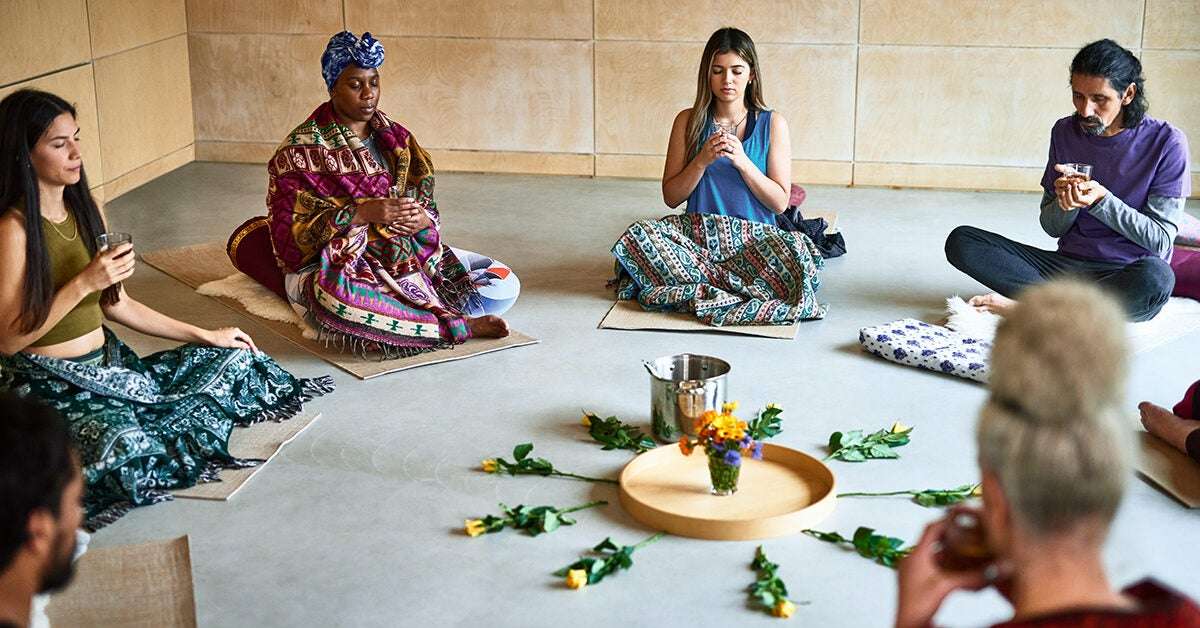-
Mayo Mindfulness: Connecting spirituality and stress relief
Share this:





 Taking the path less traveled by exploring your spirituality can lead to a clearer life purpose, better personal relationships and enhanced stress management skills.
Taking the path less traveled by exploring your spirituality can lead to a clearer life purpose, better personal relationships and enhanced stress management skills.
Some stress relief tools are very tangible: exercising more, eating healthy foods and talking with friends. A less tangible — but no less useful — way to find stress relief is through spirituality.
What is spirituality?
Spirituality has many definitions, but at its core spirituality helps to give your life context. It’s not necessarily connected to a specific belief system or even religious worship. Instead, it arises from your connection with yourself and with others, the development of your personal value system, and your search for meaning in life.
For many, spirituality takes the form of religious observance, prayer, meditation or a belief in a higher power. For others, it can be found in nature, music, art or a secular community. Spirituality is different for everyone.
How can spirituality help with stress relief?
Spirituality has many benefits for stress relief and overall mental health. It can help you:
- Feel a sense of purpose.
Cultivating your spirituality may help uncover what’s most meaningful in your life. By clarifying what’s most important, you can focus less on the unimportant things and eliminate stress. - Connect to the world.
The more you feel you have a purpose in the world, the less solitary you may feel — even when you’re alone. This can lead to a valuable inner peace during difficult times. - Release control.
When you feel part of a greater whole, you may realize that you aren’t responsible for everything that happens in life. You can share the burden of tough times as well as the joys of life’s blessings with those around you. - Expand your support network.
Whether you find spirituality in a church, mosque or synagogue, in your family, or in nature walks with a friend, this sharing of spiritual expression can help build relationships. - Lead a healthier life.
People who consider themselves spiritual may be better able to cope with stress and may experience health benefits.
Discovering your spirituality
Uncovering your spirituality may take some self-discovery. Here are some questions to ask yourself to discover what experiences and values define you:
- What are your important relationships?
- What do you value most in your life?
- What people give you a sense of community?
- What inspires you and gives you hope?
- What brings you joy?
- What are your proudest achievements?
The answers to such questions can help you identify the most important people and experiences in your life. With this information, you can focus your search for spirituality on the relationships and activities in life that have helped define you as a person and those that continue to inspire your personal growth.
Cultivating your spirituality
Spirituality also involves getting in touch with your inner self. A key component is self-reflection. Try these tips:
- Try prayer, meditation, mindfulness and relaxation techniques to help focus your thoughts and find peace of mind.
- Keep a journal to help you express your feelings and record your progress.
- Seek out a trusted adviser or friend who can help you discover what’s important to you in life. Others may have insights that you haven’t yet discovered.
- Read inspirational stories or essays to help you evaluate different philosophies of life.
- Talk to others whose spiritual lives you admire. Ask questions to learn how they found their way to a fulfilling spiritual life.
Nurturing your relationships
Spirituality is also nurtured by your relationships with others. Realizing this, it’s essential to foster relationships with the people who are important to you. This can lead to a deepened sense of your place in life and in the greater good.
- Make relationships with friends and family a priority. Give more than you receive.
- See the good in people and in yourself. Accept others as they are, without judgment.
- Contribute to your community by volunteering.
Pursuing a spiritual life
Staying connected to your inner spirit and the lives of those around you can enhance your quality of life, both mentally and physically. Your personal concept of spirituality may change with your age and life experiences, but it always forms the basis of your well-being, helps you cope with stressors large and small, and affirms your purpose in life.
This article is written by Mayo Clinic staff. Find more health and medical information on mayoclinic.org.
Share this:





Related articles

Can blood donors suffer iron deficiency?
With the constant need for blood and platelet donations, frequent, regular blood donors are crucial to having a continuous national blood supply. Across Mayo Clinic […]

Mayo Clinic Minute: Role for opioids
Drug overdoses from opioids have been linked to a decreased life span, according to recent data from the Centers for Disease Control and Prevention. The […]

Mayo Clinic researchers identify women with twice the risk of cancer in both breasts
ROCHESTER, Minn. — Women with cancer in one breast may be at higher risk of developing cancer in the opposite breast if they are carriers […]
A religion is a codified set of beliefs and practices shared by a group of individuals regarding their relationship with a Higher Power (or powers). In contrast, spirituality is about an individual’s relationship with a Spirit (which can be a Higher Power like a God, or is a simply a representation of human being’s connection to a metaphysical reality greater than oneself). People can be religious without being spiritual (if they are simply going through the motions of following the practices of the group) and vice versa, there are individuals who are spiritual without being religious (people who do not subscribe to a particular religion’s belief system, but still feel connected to and contemplate the larger world and the universe beyond).
Spiritual and religious people find various ways to express these qualities by praying, attending religious services, interacting with people who share the same beliefs, meditating, viewing or making art or music, visiting nature, etc. Because many people view the term “spirituality” as the more all-encompassing term, we will use it in this discussion as well. Spirituality can decrease stress, by allowing a person to:
- Create a sense of quiet, stillness, and peace. We spend so much time rushing from activity to activity and trying to get things done. Similarly, we spend a great deal of time either listening to (or vigorously trying to distract ourselves from) a myriad of thoughts that are rushing around in our minds. Practicing spirituality can give us a quiet respite from all of this rushing around. Time spent meditating, praying, or just appreciating what is around and within us in that given moment can allow space to detach from and find perspective on stressors, enhance our sense of awe at the amazing world that is around us, as well as give us time to gain some or all of the other positive benefits described next.
- Give up control. Believing in something greater than ourselves allows us to realize that we aren’t responsible for everything that happens in our lives. Bad things and good things will happen no matter what, through no fault (or through no specific effort) of our own. Spirituality can allow us to release (or at least decrease) the need to always blame ourselves for bad times and/or continuously scramble to achieve good outcomes.
- Increase meaning. When those inevitable positive and negative events happen, spiritual practice can help us look for a way to think about those events in a meaningful way. Asking “What can I learn?” or “How can I grow stronger?” instead of asking “Why me?” when something bad happens can serve to decrease negative stress feelings fuel constructive behavior. Similarly, feeling grateful when good things happen can help to spur us to “spread the wealth” and practice altruistic acts toward others.
- Enhance a sense of connectedness. Feeling a part of something greater than ourselves can make us feel less isolated and alone. In addition, many people who belong to religious and/or spiritual groups receive social support benefits (interpersonal interactions; group activities; mentoring; help with money, food, transportation, respite, etc. in times of need). Most stressors seem smaller and more easy to deal with if we know that we belong to and can connect with a group (or a higher power, or the universe) who can offer acceptance, solace, strength and possibly even solutions.
- Maintain a sense of purpose. Most of us have spent some time wondering what life is “all about.” People who start to think that meetings, unpleasant chores, and the “rat race” is all that there is to life frequently start to feel depressed and stressed. The enhanced sense of connectedness and increased sense of meaning derived from spiritual practices allow us to look beyond ourselves, which increases our sense of responsibility for our wider community and universe.
- Gain perspective. Spiritual practice can help us to shrink obstacles that seem insurmountable into something approaching a manageable size. In addition, spirituality helps us to clarify our values, and focus on related goals that are important, rather than becoming consumed by material things or circumstances that are truly unimportant.
There are all sorts of ways to cultivate your spirituality. Probably the most common (and most formal) way to plan out your spiritual practice is to join a particular religious group whose beliefs match (or closely match) your own. However, joining a group is not necessary or sufficient to grow your spiritual life (e.g., people who belong to but do not gain benefits from their particular religious group). Other ways to enhance spirituality include:
- Using prayer, meditation and/or relaxation techniques on a routine basis.
- Keeping a journal to help you express your thoughts and feelings and to record your progress.
- Seeking out a trusted adviser or friend, or reading inspirational stories or essays to learn how to lead a fulfilling spiritual life.
- Being open to new experiences. If you are dissatisfied with a particular type of organized religion, try a new one (or multiple ones). Similarly, if a particular practice (art) doesn’t enhance your spirituality, try something different (visiting nature).
- Sharing your spiritual journey with loved ones, and invite them to discuss their journey with you. During these discussions, remember that different people travel very different spiritual paths; try to resist the temptation to view and behave as if your particular path is the best (or only correct) way.
- Striving to see the good in other people and in yourself.



